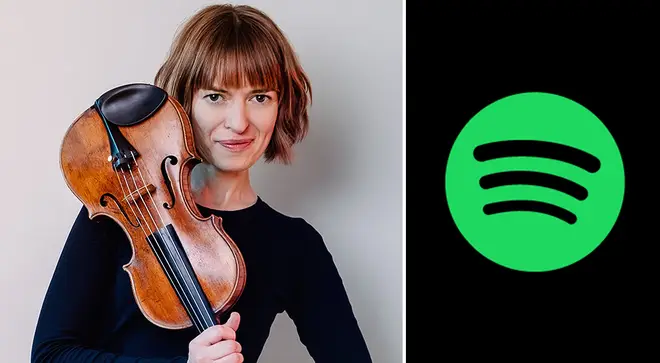‘87p for over 1,000 streams?’ – musicians hit out at meagre Spotify earnings as MPs launch inquiry
5 November 2020, 11:57 | Updated: 5 November 2020, 12:12

Today, a violinist is playing one minute of music on loop for four and a half hours, to shine a light on what musicians have described as “pitiful” earnings from major streaming services.
Last month, a government inquiry was launched into the ‘Economics of Music Streaming’. It came after five months of campaigning from two music bodies, whose musician members had told of the meagre earnings they appeared to be making from streaming platforms – namely, Spotify.
“Currently even extremely successful music creators receive very little from streaming,” says violinist Fenella Humphreys, referring to a recent interview by violin virtuoso Tasmin Little, during which she detailed the meagre earnings she receives from streaming.
Little explained that from five to six million Spotify streams over a six-month period, she had received just £12.34.
“And yet streaming platforms such as Spotify earn billions,” Humphreys says, citing a report which states in 2020, Spotify’s ‘revenue rose 13 percent to 1.89 billion euros for the three months ended June 30’.
Read more: Spotify boss blames musicians for lack of earnings, says they should make more music >

When it comes to the fairness of streaming for artists, the conversation is finally happening. But with the pandemic leaving many musicians without any live concert work, Humphreys wanted to do something more to highlight the plight of artists.
It started with a tweet from composer Stuart MacRae, who decided to conduct his own Spotify earnings experiment. He played one of his own works on repeat for two days, generating over 1,100 plays. From this, MacRae says he received 87p.
Then, he worked out how much he’d get after streaming it 24/7 for a whole year. The result? £172.64.
As a wee experiment, earlier this year I streamed my shortest Spotify track 'A Caucus Race' on loop for approx. 2 days, generating over 1100 plays, and here's the result:
— Stuart MacRae (@stuart_macrae) October 15, 2020
87.89p / 1173 plays = 0.075p per play. If I streamed it 24/7 for a year I'd get c.£172.64 pic.twitter.com/gHq8WwplMY
Today – Thursday, 5 November – Humphreys is playing the composer’s one-minute Variation on loop in a symbolic four-and-a-half-hour living room concert, during which listeners will be encouraged to donate what they feel the music is worth. Any donations will be shared with Help Musicians UK, who have been a major support for musicians in lockdown.
“Stuart and I both believe that people value music and its creators more than the 87p would suggest,” Humphreys adds. “We decided to do the livestream on Thursday as a small experiment, partly to find out what people feel the music is worth, and partly to draw attention to the DCMS’s inquiry into the finances of music streaming.”
While many professional musicians cannot perform live for audiences, Humphreys also wants to highlight the crucial role streaming could be playing, for artists living through pandemic times. “If we had fairer streaming, at least musicians would have some income while live performance cannot happen.”
Humphreys adds: “People have turned so much to music during lockdown. And yet, the same lockdown has meant the freelance musicians creating that music simply cannot earn.
“This problem was already a big deal, but now with live performing on its knees, it feels more important than ever to do everything we can to draw light to it.”

Stuart MacRae Variation on Paganini 24 - how much is a stream worth?
The inquiry, in which MPs will examine what economic impact music streaming is having on artists, record labels and the sustainability of the industry, follows five months of campaigning by The Ivors Academy and Musicians’ Union.
On the committee’s website, it adds that while music streaming in the UK brings in more than £1 billion in revenue with 114 billion music streams in the last year, artists are often paid as little as 13 percent of the income generated. Artists are now being encouraged to present evidence of their own earnings to the inquiry.
The Ivors, who have shown their support for Humphreys’ livestream, have described it as maybe “the biggest opportunity we will collectively get to make the case for a fairer deal for songwriters, composers, and performers.”
Humphreys says she hopes the inquiry’s results will “begin actions that mean these earnings are distributed more fairly to the artists who create the music people enjoy.”
Speaking in August, Spotify boss Daniel Ek said: “... Unequivocally, from the data, there are more and more artists that are able to live off streaming income in itself.”


































